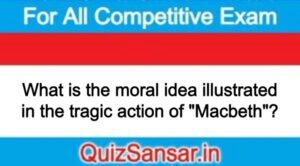
What is the moral idea illustrated in the tragic action of “Macbeth”?
What is the moral idea illustrated in the tragic action of “Macbeth”?
Ans.
The moral idea in ‘Macbeth‘ is the same as it is in other tragedies of Shakespeare. That is evil suffers and good triumphs, the vicious are destroyed along with the innocent and the errors bring on their inevitable reaction in suffering and death. The sower reaps the fruits he has helped to grow, Character, in other words, becomes fate. This is the broad moral idea in all Shakespearean tragedies. It is not directly spoken of by the characters. It is made plain in the course of dramatic action.
Evil forces win momentarily
In ‘Macbeth’ evil is represented in the characters of the hero Macbeth and his wife. They permit themselves to be swayed by evil passions. And their passions spin the plot. They betray their better nature by permitting their baser acts to dominate them. They fondly imagine that their crime will remain hidden and passed over. Lady Macbeth is certain that no one will dare detect them as criminals. They imagine, once a deed is done it is done with. Macbeth, of course, doubts and hesitates but his wife never does so. And he is domineered by his wife in the perpetration of first crime. Hence the murder of Duncan is committed under the illusion of safety, security and impunity. But it is shown in the play that crimes are never hidden for long and that they bring on retribution and nemesis.
Moral Order prevails ultimately
If this were all, tragedy would end in pessimism-if evil is shown as suffering and man shown as a victim of evil the impression would certainly be one of pessimism and depression. Great tragedies, howe er, do not leave such an impression. They end with a note of victory for the good along with the defeat of the evil. And so it is in “Macbeth”. The evil in Macbeth and his wife makes them victims of suffering and death but the good characters, Malcolm, Macduff and others are shown as triumphant in the end. Moral order, no less than political order, is restablished after a brief gap in which both these we upset. This brings an impression that life is worth living and fighting for. It strengthens our faith in the moral order of the world which does not permit evil to succeed. The forces of that moral order are more numerous and powerful than the forces of treason, evil and vice. They are represented by the people at large-the mass of subjects who rese in revolt to bring the tyrant down form his ill gotten power which he abuses. Thus, an impression of moral order is produced at the end of the play.
-
Write the critical appreciation of the poem No. 12 entitled Far Below Flowed.
-
Write the critical appreciation of the poem No. 11 entitled Leave this Chanting.






